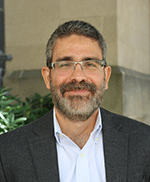College hosts Boston University scholar, speaks at event for Reformation anniversary

October 1, 2017
The Saint Anselm College Theology department recently hosted its first of several theology events commemorating 500 years of the Protestant Reformation, showing how far both the Catholic Church and the college itself have come in interacting with the Protestant world.
The event, a lecture titled ‘Martin Luther in Latin America: From the Counter-Reformation Myth of Latin American Catholicism to Martin Luther as Religious Caudillo’ was given by Professor Roldan-Figueroa from Boston University’s School of Theology. The lecture covered a wide variety of topics, including Latin American responses to Protestant movements, Christian mysticism regarding the New World, and the role of the Church in everyday life in several Latin American countries, such as Uruguay and Peru.
To begin the event, Professor Ward Holder of our own Theology department introduced Roldan-Figueroa: “It has been my pleasure to know Professor Figueroa for fifteen years. I have enjoyed his company. He is a brilliant scholar. He is one of the few scholars who had masterly concepts of earlier studies.”
The lecture pointed to a variety of factors inhibiting the growth of Protestantism in Latin America; such factors as geographic isolation, Spanish efforts to institute Catholicism and exclude other branches of Christianity from the New World, and the mystical Christian mission to proselytize the people of the New World to bring them closer to God as a way of ‘being even” for “England’s loss to Protestantism.”
Roldan-Figueroa’s work also discussed Spanish historical works of antiquity and their descriptions (or lack thereof) of Protestantism in New Spain and other parts of Spanish America. He noted the historical analogue drawn between Hernan Cortes and Martin Luther, with the former being presented as a noble knight and hero of Catholic Christianity and the latter being portrayed by Spanish sources as a “troublemaker.” This perception takes a certainly Catholic stance, but nevertheless portrays the opinions of Spanish thinkers of the time of Protestantism as dangerous.
The lecture also noted the perceptions of Martin Luther as a political, rather than intellectually revolutionary, which to thinkers of his time made him “not a revolutionary, but a brute who resorts to force to get what he wants.”
The event represents a warming of relations between the Catholic Church and Protestant heretics. Relations between the Catholic Church of Rome and the various Protestant Branches have been strained since the initial Great Schism between the two in 1517.


